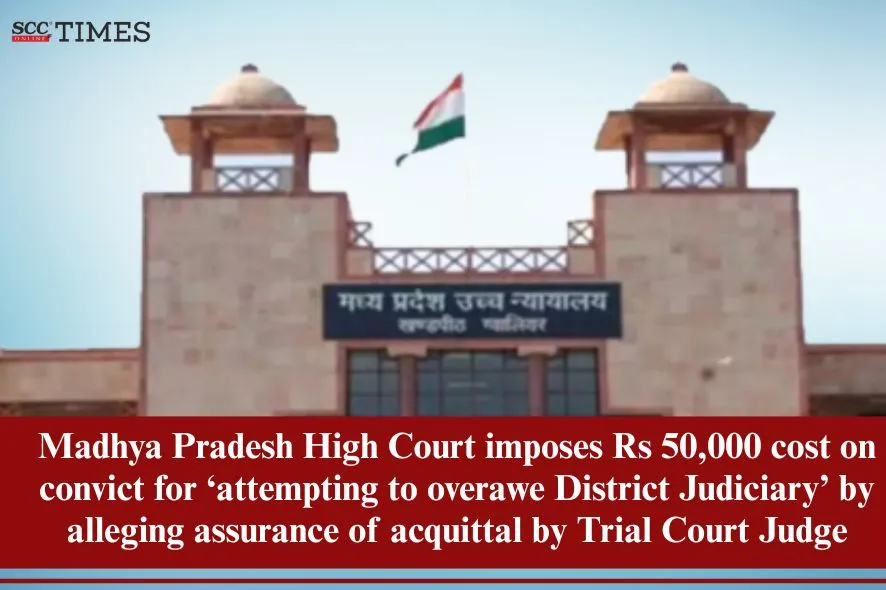Madhya Pradesh High Court: In a writ petition filed against a non-speaking administrative order of the High Court in a complaint filed by him against the Trial Court Judge for allegedly assuring the convict that he would be acquitted, the Division Bench of Atul Sreedharan* and Amit Seth, JJ., dismissed the petition, holding that the convict’s act was an attempt to overawe the District Judiciary by making frivolous and outrageous allegations against the Judicial Magistrate First Class (‘JMFC’), Umariya. The Court imposed a cost of Rs 50,000 to be paid by the convict to the Madhya Pradesh State Legal Services Authority within ten days.
Background
The convict was sentenced under Section 332 of the Penal Code, 1860 (‘IPC’) by the respondent 2, the then JMFC. Aggrieved, the convict filed an appeal against the conviction and sentence, which was pending before the Sessions Court.
While the said appeal was pending, the petitioner filed a complaint before the Registrar (Vigilance), Madhya Pradesh High Court against the JMFC, alleging that three eye witnesses produced before the Trial Court did not implicate him under Section 332 of the IPC. He further alleged that the JMFC had allegedly assured the petitioner that it was not necessary to produce any defence witnesses, as none of the prosecution witnesses implicated him. He added that the JMFC “openly” told him that two witnesses had become hostile and the cross-examination of the third witness could not be done. Therefore, there was no point in the petitioner bringing any evidence in his defence. The convict further alleged that the JMFC behaved as though he was completely innocent and that she was going to pass an order of acquittal, which she allegedly assured him several times during the course of the trial. Thus, he was surprised upon being convicted.
After examination of the complaint, the Chief Justice directed that the matter be filed, via the impugned order. However, the impugned order was not a reasoned one.
Aggrieved by the same, the convict filed the present petition stating that an administrative order had to be a speaking one.
Analysis
At the outset, the Court explained that every administrative order that is deficient in reasoning cannot be challenged. Not every order that is passed by an executive authority can be challenged on the ground that it is a non-speaking order. For a non-speaking order to be challenged, the same must impose a statutory duty on the authority to pass a speaking order, or the same must result in the violation of a statutory, constitutional, or legal right of the aggrieved, giving rise to an actionable claim against the State or its instrumentality.
The Court further explained that the authority to take cognizance of a wrong committed by an erring Judge acting in his/her judicial capacity was only of the High Court. A complainant merely does the work of a messenger by bringing the error on the part of the Judge to the notice of the High Court. The complainant is not a person aggrieved when he or she informs the High Court to act against the erring Judge for his judicial decision, and the role of the complainant comes to an end with the complaint being referred to the High Court. The decision to act against such a District Judge on the administrative side is not a legal right vested in the complainant, but the prerogative of the High Court under Article 227 of the Constitution.
The Court added that if a person is aggrieved by the actions of a Judge, which are not related to the discharge of his official functions, but rather due to infringement of a legal right on account of a non-judicial action, he may be a person aggrieved and there exists an alternative remedy against the Judge.
Upon perusal of the complaint, the Court held that the facts mentioned therein were unverified, preposterous, and fanciful. The allegation was regarding an undertaking given by the JMFC that the convict would not be required to produce the defence witnesses as the prosecution evidence was inadequate for conviction. No reference regarding place, time, date, or where such statements were made was given in the complaint.
The Court remarked that the actual reason for filing the complaint appeared to be the attainment of a finding on the factual aspects of the convict’s criminal case from the High Court on the administrative side and using the same to influence the proceedings before the Sessions Court, where the appeal was pending.
The Court further held the convict’s act was an attempt to overawe the District Judiciary by making frivolous and outrageous allegations against the JMFC, which was deplorable and needed to be dealt with a heavy hand.
“As it is, the Judges of the District Judiciary of Madhya Pradesh find themselves between the devil and the deep sea. On one side they have the High Court literally breathing down their neck, instilling in them an unwarranted fear of action on the administrative side for their judicial orders resulting in acquittals and granting bails, and on the other hand, the District Judges have to face such frivolous complaints from unscrupulous litigants who exploit the mindset of the High Court to bring pressure to bear upon the judges of the district judiciary.”
Thus, the petition was dismissed with a cost of Rs 50,000 to be paid by the convict to the Madhya Pradesh State Legal Services Authority within ten days from the date on which this order was uploaded, failing which the Court shall ensure that the same was recovered from him as arrears of revenue.
[Rajneesh Chaturvedi v. High Court of Madhya Pradesh, 2025 SCC OnLine MP 5315, decided on 10-07-2025]
*Judgment authored by: Justice Atul Sreedharan
Advocates who appeared in this case :
For the petitioner: Senior Advocate Narinder Pal Singh Ruprah, Muskan Anad
For the respondent: Government Advocate Rajvardhan Dutt Pararha





